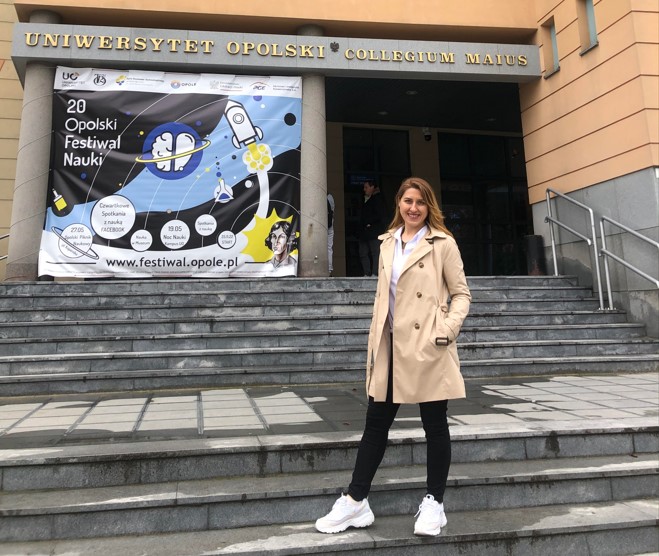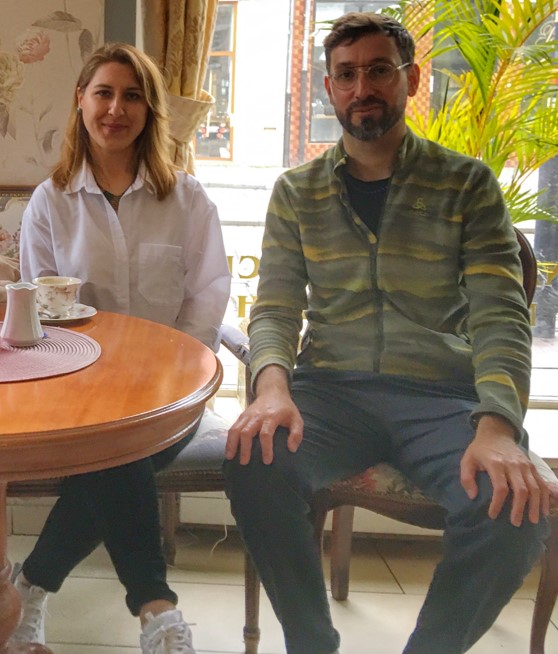Seda Güven came to the Faculty of Philology from the Osmangazi University of Eskisehir, among other activities she gave a mindfulness workshop to the teachers training group of the English Philology students on May 16, 2023. Seda graduated from English programmes at the MA level and right now she is an English instructor at ESOGU and she also pursues her PhD in sociology of emotions at Anadolu University in Eskisehir. We sat down with her to talk about Turkish academia, Polish students and emotions. Dr. Michał Wanke, the departmental Erasmus+ coordinator and a sociologist working at the Faculty of Philology, was the interviewer.
Hocam, why Opole?
Opole is located on the banks of a river and is called Polish Venice because of the canals and bridges just like Eskisehir, which is known as Turkish Venice, and this made me really curious about life here. Actually it was not just the city that attracted me but also the university itself, which is a well-known educational establishment with strong ties with so many universities abroad.
Can you explain to our colleagues, what is it about ‘hocam’ that makes it such an important part of life in Turkish academia?
‘Hocam’ literally means ‘my teacher’ and is used to show respect regardless of title. Our students don’t call us by our names because it is considered to be too informal and impolite. We also, as colleagues, call each other ‘hocam’ if we are not that close, and especially if there are students around. There is also another thing about it. I received my BA from METU, where it is a tradition to call everyone ‘hocam’. I really mean everyone, such as students, bus drivers and medical doctors, and the philosophy behind it is that everyone can learn something from each other.
You are a trained English philologist, yet you decided to switch to sociology? I personally approve of such a transition, but can you explain your motivation?
Besides languages, I have always been interested in humanities. I did my MA in TEFL, and the focus of my thesis was on intercultural communicative competence. Sociology is a subject that studies society and also aspects of culture associated with everyday life. It provides me with new perspectives to see the world.
Your PhD thesis tackles migration and emotions – why is this combination important?
Unfortunately lots of my high-skilled friends migrated to different countries. Brain drain is a serious issue in Türkiye and that’s why I’m interested in migration studies. I came across an article about Irish married women who migrated to London and sometime later got divorced, which was something unacceptable in Ireland at that time. They had so many emotional difficulties and needed their parents’ emotional support, but couldn’t even talk to them about it and they had to do so much emotional work. We assume that high-skilled migrants have a kind of flawless life and expect them to be happy and successful most of the time, and just because of that they have a tendency to hide that part of their lives. I want to hear about the migration process from them with the details and try to see it from their point of view.
Speaking about emotions – you gave an inspiring mindfulness workshop to our students. Can you tell us more about it?
So many of us have hectic lives, we are always busy with something or carried away with our thoughts and not really aware of the things happening at that moment. Students have so many exams to take or assignments to finish, which make them stressed out or anxious most of the time. And teachers immediately react when something they don’t expect happens in the class instead of responding. Mindfulness means being aware of our body, mind and emotions and helps us to be calm and reduce stress and anxiety. Everyone needs to be mindful, instead of having a mind full of confusing thoughts. As teachers, if we practice mindfulness and introduce it to our students, we will make a big difference both in our and their lives. We will have more job satisfaction and it will be easier for students to focus and learn new things as mindfulness supports SEL. It is as important as being a trauma-informed teacher. And it made me really happy to see that your prospective teachers are interested in learning more about integrating mindfulness into teaching. The future is bright.
I also want to ask you about your favorite Turkish food. This interview is going to a Polish outlet, so it doesn’t make too much sense to ask you about Polish food really… Kebab or tantuni?
If I have just two options to choose between, I would go with kebab, but my favorite dish is karnıyarık. It is eggplant stuffed with a mix of sautéed chopped onions, garlic, black pepper, tomatoes, parsley, and minced meat. You can just google it to see how it looks.
Çok teşekkürler for the conversation, hocam!
I appreciate your hospitality, hocam. I enjoyed every moment of my stay. Dziękuję.
Glossary:
METU – Middle Eastern Technical University in Ankara, Türkiye
TEFL – Teaching English as a foreign language
SEL – Social emotional learning


